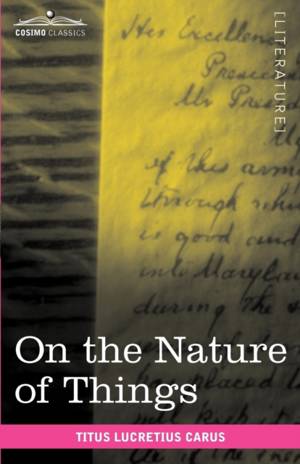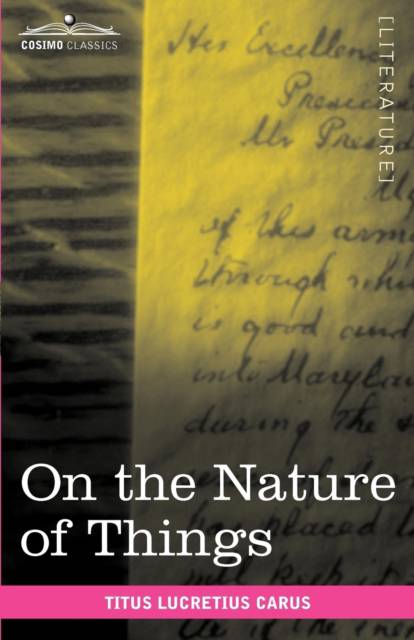
Bedankt voor het vertrouwen het afgelopen jaar! Om jou te bedanken bieden we GRATIS verzending (in België) aan op alles gedurende de hele maand januari.
- Afhalen na 1 uur in een winkel met voorraad
- In januari gratis thuislevering in België
- Ruim aanbod met 7 miljoen producten
Bedankt voor het vertrouwen het afgelopen jaar! Om jou te bedanken bieden we GRATIS verzending (in België) aan op alles gedurende de hele maand januari.
- Afhalen na 1 uur in een winkel met voorraad
- In januari gratis thuislevering in België
- Ruim aanbod met 7 miljoen producten
Zoeken
Omschrijving
Titled De rerum natura in Latin, On the Nature of Things, written by Titus Lucretius Carus and translated by John Selby Watson, is an epic poem and philosophical essay in one. Written with the intent of explaining Epicurean philosophy to the Romans, the original poem was divided into six books and written in dactylic hexameter. The overarching principle in the book explains the human role in a universe ruled by chance. Notable is the absence of the gods the Romans depended upon; though LUCRETIUS invokes the goddess Venus in the poem's opening lines, he uses her merely as an allegory for sexual and reproductive power. Other themes throughout the poem include the nature of the soul and mind, why we sense and feel and think, principles of the void and atomism, the creation and evolution of the world, and celestial and terrestrial phenomena (and their differences). It tries to explain human life and purpose in a nutshell, or the nature of the Universe--a way for people to cope and understand in a confused and terrifying world. TITUS LUCRETIUS CARUS (c. 99 BC - 55 BC) was a Roman philosopher and poet. Very little is known about his life, and his only known work is the epic poem on Epicurean philosophy, On the Nature of Things. He dedicated the work to the famous Roman orator and poet Gaius Memmius, who may have been a friend, and it is thought that he may have died before he finished editing the poem, as it ends rather abruptly. The book's translator, JOHN SELBY WATSON (1804-1884), was a British translator and writer, convicted and sentenced to life imprisonment for murdering his wife in 1872.
Specificaties
Betrokkenen
- Auteur(s):
- Vertaler(s):
- Uitgeverij:
Inhoud
- Aantal bladzijden:
- 308
- Taal:
- Engels
Eigenschappen
- Productcode (EAN):
- 9781616402778
- Verschijningsdatum:
- 1/07/2010
- Uitvoering:
- Paperback
- Formaat:
- Trade paperback (VS)
- Afmetingen:
- 140 mm x 216 mm
- Gewicht:
- 390 g

Alleen bij Standaard Boekhandel
+ 43 punten op je klantenkaart van Standaard Boekhandel
Beoordelingen
We publiceren alleen reviews die voldoen aan de voorwaarden voor reviews. Bekijk onze voorwaarden voor reviews.









